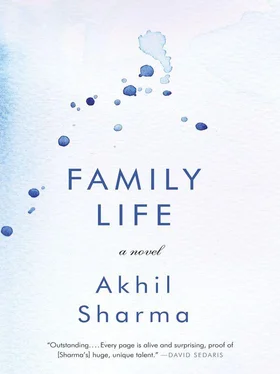Mr. Mehta had traveled the world. He had been to Rome. “If we had broken buildings like that in Delhi, no whitey would say, ‘Isn’t this wonderful?’” Mr. Mehta had also been to Paris. “Every building there looks like Parliament House. It is the most beautiful city in the world. There is dog shit everywhere, though. What is the point of a city being so beautiful if you have to always be looking down?”
One morning, Mr. Mehta’s small brown hatchback did not pull up in front of our lawn. At ten o’clock, my mother phoned his house. She sat at the kitchen table, the cordless phone to her ear and the phone’s antenna outstretched. From where I stood, I could hear the high complaining voice of Mrs. Mehta. She said Mr. Mehta was sick, and something in her tone suggested that we were stupid to call and inquire. The next day, my mother phoned again. The third day, as I watched my mother punch in the numbers, I felt helplessness that my mother wouldn’t stop calling.
Mrs. Mehta’s voice came sharp over the phone. “Yes, he is still sick,” she said and hung up.
My mother turned toward me. Her face was tight. “Indians are that way. They are cowards. Instead of admitting they made a mistake, they would rather lie and try to blame you.”
THE STRANGENESS OF the miracle workers made the days dreamlike. The next miracle worker was a white-skinned man with green eyes and a square flabby face. This man had been born in Kashmir and lived in Philadelphia. He told us that the drive to our house took two hours. As soon as he said this, I knew he wouldn’t come for long.
On his first day, the man complained about the heat. My mother and I placed three table fans on the floor of Birju’s room, their heads tilted up, turning side to side.
Regularly the man went outside to smoke on our front steps. As he smoked, he looked so angry that it was as if he had just been insulted. “My God,” my mother said, “I feel frightened asking him to stand away from the house.”
On his third day, the man arrived and, within an hour, said he was going out to smoke. Instead he walked down the steps, crossed the lawn to his car, got in, and drove away.
That night, during Birju’s oral feeding, my mother told my father that she had no choice, that she had to try everything to wake Birju. “What kind of mother would I be if I don’t try?”
My father didn’t answer. He looked down at Birju’s food smeared face.
“What kind of mother would I be?”
Again my father didn’t respond.
“I am a mother,” she said. It was as if she wanted a fight and so wouldn’t stop talking.
“If there were a cure, Shuba,” my father said finally, still keeping his eyes on my brother, “wouldn’t it be in all the newspapers?”
After this man there was a woman who tried bathing Birju with turmeric powder. Birju began to look orange.
Then there was an elderly man who walked with a stoop. On his first day, he gave me eleven dollars. I felt embarrassed because I wanted the money but was afraid that by taking it I would give up my right to hate him.
This man’s cure involved sitting by my brother and reading facts about him from a yellow legal pad. He would sit behind Birju’s head and rest his hands on Birju’s temples. This was to allow healing powers to flow from his body into my brother’s. “My name is Birju Mishra. I was born on October 7, 1968. My favorite hobby is making model airplanes. My ambition is to be a surgeon. My best friend is Himanshu. I got into the Bronx High School of Science.”
Eventually, the man grew bored with trying to wake Birju. At some point, he suggested that he teach me exercises for my back.
“My back is fine,” I said.
My mother said, “When you’re older, it won’t be. Learn now.”
The man had me lie on Birju’s floor and raise my feet into the air and try touching my toes.
August fifth was the second anniversary of Birju’s accident. That morning, when I woke up, I lay on my side. I couldn’t believe that everything had changed because of three minutes.
One evening, not long after the anniversary, my father was in Birju’s room drinking tea. I came and stood next to him. I was very unhappy. My father must have sensed this. He patted my head quickly, and in his quickness I knew that there was both an acknowledgment of me and also a desire that I move away and not say anything. After a moment I said, “Daddy, I am so sad.”
“You’re sad?” my father said angrily. “I want to hang myself every day.”
Birju was lying on his exercise bed. It was the first day of seventh grade and I had just come home. I saw my brother and began screaming. “Hello, fatty! Hello, smelly! Who have you been bothering today?” I was standing in the doorway that my father and I rolled Birju through each morning. I was grinning. “Do you think of anybody but yourself?” I shouted. “In my life I have never met anyone so selfish.” It was a gray day. The chandelier was lit. Birju was wearing thin cotton pajamas. He was puffing spit, his eyes rolled back as if he were trying to remember something. “Smelly! Smelly!” I shouted. I didn’t know why I was screaming. I felt possessed.
I walked up to the exercise bed. I took the washcloth that lay on Birju’s chest and wiped his mouth and chin. The cloth caught on his stubble, and I had the feeling that I was hurting him. “All day you do nothing,” I scolded. “All day you lie here and fart.” A fear like cold seeped into me. “I have to go to school. I have to study and take tests.” The more I talked, the more scared I got. It was as if my own voice was pumping fear into me.
Sitting in a folding chair with my elbows on the bed, I heard my voice growing shrill. “Birju brother, you are lucky not to go to school. In seventh grade, we walk from class to class. It isn’t like elementary school where you stay in one room and teachers come to you.” As I said this, I became aware that while for me, time passing meant new schools and new teachers, for Birju, it meant wearing thin cotton pajamas and then flannel ones. I became so afraid I hopped up.
I climbed into the exercise bed. I lay down next to Birju. I slipped an arm under his shoulders. Birju’s breath smelled of vomit. He smacked his lips. He still looked lost in thought. Till that day, perhaps because Birju had been mostly in the hospital and nursing home and these had seemed temporary, some part of me had seen the difference between our lives as also temporary. Now, going to school and coming back home and seeing him, no part of me could deny how much luckier I was than my brother.
“Brother-life,” I said, using the phrase because it was melodramatic and because by saying something melodramatic, I could make myself sound ridiculous, like a child, and so not to be blamed for my good luck of being OK, “my English teacher wanted us to write a paragraph on what we did during the summer. I didn’t have a pencil. What kind of fool am I?” As I spoke, I had the feeling that I was being watched. I had the sense that some man was looking at me and that this man knew I was not very good and yet I had received so much of my family’s luck. I began speaking in an even more childish voice. “I have homework. It’s the first day of school, and I have homework. I wish I were back in first grade.” As I spoke, I remembered Arlington. I remembered lying on my mattress and talking to God. The fact that nothing had changed, that Birju was still the way he was, that we still needed him to be OK to be OK ourselves, made me feel like I was being gripped and slowly crushed. “Wouldn’t it be wonderful to get good marks without having to work? Brother-life, tomorrow you go to school and I’ll stay home. I took a lunch box to school. In seventh grade, you don’t take lunch boxes. Boys made fun of me.”
Читать дальше












